A summary of ICLEI’s position following the outcomes of the 28th session of the Conference of the Parties to the UNFCCC (COP28)
We, the undersigned local and regional leaders from ICLEI – Local Governments for Sustainability who attended COP28, welcome the key outcomes, including the unprecedented but necessary call to “transition away from fossil fuels,” the setting of the global goal on adaptation and the establishment and funding of a critically needed Loss and Damage fund. As a part of ICLEI, the global network working with more than 2,500 local and regional governments in 125+ countries committed to sustainable development, we applaud the outcomes of COP28 as a critical opportunity for all countries to accelerate climate efforts and chart a course toward a more sustainable and resilient future with all levels of government effectively working together.
Urban areas are on the front lines of the climate crisis. Faced with escalating extreme weather events, urban centers worldwide grapple with the dual task of preparing for inevitable climate impacts and actively seeking sustainable solutions that address their contexts and needs.
Hundreds of leaders from cities, towns and regions in the ICLEI network attended COP28 this year to demonstrate their critical role in achieving not only their own ambitious climate action goals, but also national and global climate goals.
Since COP21 in Paris, thousands of cities, towns and regions have declared climate emergencies, adopted ambitious targets, implemented critical greenhouse gas reduction strategies, enhanced local resilience, and helped accelerate national climate commitments.
Cities, towns and regions around the world are already phasing out fossil fuels thereby tackling the leading human contribution to the climate crisis, air pollution and environmental damage. We herald the commitment to transition away from fossil fuels at COP28, but acknowledge that we must move faster and further to ensure all levels of government accelerate fossil fuel phase out while transitioning towards renewable energy and optimizing energy efficiency, and have the means to prepare for current climate impacts as soon as possible.
Strong references to multilevel action in the outcomes of this COP mean that national governments should enable all subnational governments to step up integrated climate action, to achieve sustainable, equitable and resilient development. We welcome national governments’ inclusion of multilevel action in the next round of Nationally Determined Contributions (NDCs) to raise their level of ambition, to be submitted at COP30, in Belém, Brazil.
At COP28, as local and regional leaders, we had a seat at the table like never before, including during COP28 Presidency-hosted events such as a dialogue with Heads of State, the Local Climate Action Summit, the Ministerial Meeting on Urbanization and Climate Change and the NDCs-NBSAPs Ministerial. We recognize and commend the leadership of the COP28 Presidency, as well as High Level Champion Razan Mubarak and all UAE COP28 Team, supported by UNFCCC Secretariat, to make our contributions visible within the official COP agenda. This level of inclusion has set the bar high for future COP summits.
Our network, ICLEI, plays a special role within the COP space. For over twenty years, the Local Governments and Municipal Authorities (LGMA) Constituency has been a driving force in bringing the voices of local governments to the forefront of global climate discussions, and ICLEI serves as the official focal point of the LGMA to the UNFCCC. This year, the LGMA had a strong position going into COP28, which we support.
With the Global Stocktake underway, ICLEI has offered local and regional governments a way to contribute – through local stocktakes, which have been pioneered in 30+ cities in 17 nations across six continents. We welcome the reference to “align assessments of local-level progress (‘local stocktakes’) with future iterations of the Global Stocktake” in the joint outcomes statement from the Urban Ministerial and LCAS.
We are also cheering the landmark COP28 Coalition for High Ambition Multilevel Partnership (CHAMP) for Climate Action, signed by more than 70 countries. This initiative will enhance cooperation with their local, regional and other subnational governments to collectively pursue efforts to limit the global temperature rise to 1.5 degrees above pre-industrial levels. ICLEI strongly applauds the forward-looking countries who have already pledged to join the Coalition, and we stand ready to work with these countries to implement the goals of CHAMP towards COP30.
COP28 also had a historic announcement of the Loss and Damage fund that includes direct access for subnational governments, which should provide the much-needed finances for our cities, towns and regions to respond to the impacts of climate change. Keeping with our commitment to multilevel action, we also look forward to engaging with our respective national governments on how to efficiently and effectively achieve concrete results.
The final agreement of COP28 defined a new global goal on adaptation, that recognizes the importance of local adaptation actions and local governments as one of the key stakeholders. However, the language of the agreement lacks both a strong commitment and the allocation of responsibility for closing the widening adaptation finance gap. We are nonetheless hopeful that our nations will make adaptation financing more easily available to subnational and local governments, especially in the global south.
As cities and regions with nature, we also commend the inclusion of a special climate-nature ministerial roundtable, called the NDCs – NBSAPs Ministerial Meeting, which explicitly linked biodiversity and nature to climate change mitigation and adaptation actions. We believe that cities and regions must integrate nature into their climate transition and urban policy agendas as an immediate priority, to ensure that their actions deliver net positive outcomes for nature and people, and avoid pushing further beyond our planetary boundaries. We also welcome the emphasis on systems-based integrated approaches to climate adaptation and mitigation that fully consider the linkages with nature, food, water, pollution and health.
We were also heartened to see the institutionalization of the youth voice within the COP process and the formalization of a Youth Champion. The youth embody the spirit of change and we must ensure their perspectives and passion contribute to shaping a future where sustainability is not just a goal but a way of life.
Looking forward to June 2024, two critical events – Daring Cities 2024 and the ICLEI World Congress – present opportunities to take stock of subnational climate action, work together with those national governments that have already endorsed CHAMP, and invite others to join us as we advocate to tackle the climate crisis at all policy levels. These events are uniquely positioned to help cities and regions build the momentum as we look towards COP 29 in Baku and COP30 in Belém.
With every year that passes, the climate COP becomes a more potent reminder of the work we all have to do to collectively solve the global climate crisis. We are energized by the outcomes we saw at COP28, and we are ready to bring the work home.
Signed (updated 18 December 2023):
- Jorge Alejandro Aldana Bardales, Mayor, Tegucigalpa, Honduras
- Katsunori Aoki, Mayor, Kastushika City, Japan
- Jennifer Ardnt, Mayor, Fort Collins, USA
- Nicola Armacost, Mayor, Hastings-on-Hudson, USA
- Minna Arve, Mayor, Turku, Finland, and Vice President, ICLEI Global Executive Committee
- Ravinder Bhalla, Mayor, Hoboken, USA
- Marco Antonio Bonilla, Mayor, Chihuahua, Mexico
- Daniel Carrillo Martínez, Mayor, San Nicolás de los Garza, Mexico
- Alfredo Coro II, Mayor, Del Carmen Municipality, Philippines
- Frank Cownie, Mayor, Des Moines, USA and President, ICLEI Global Executive Committee
- Luis Donaldo Colosio Riojas, Mayor, Monterrey, Mexico
- Katja Dörner, Mayor, Bonn, Germany
- Gerardo Oviedo Espinoza, Mayor, Santa Ana, Costa Rica
- Juan José Frangie, Mayor, Zapopan, Mexico
- Huguette Hernández Gómez, Secretariat of Ecology and Environment, State of Quintana Roo, Mexico
- Michael Hewitson, Mayor, Unley, Australia
- Alejandro Iván Ruz Castro, Mayor, Mérida, Mexico
- Clover Moore, Lord Mayor, City of Sydney, Australia
- Shawn Patterson-Howard, Mayor, City of Mount Vernon, USA
- Tom Roach, Mayor, City of White Plains, USA
- Cheryl Selby, Mayor, Olympia, USA
- Brigid Shea, Commissioner, Travis County, TX, USA
- Verny Valerio Hernández, Mayor, San Rafael de Heredia, Costa Rica
- Erion Veliaj, Mayor, Tirana, Albania
- Mauricio Vila Dosal, Governor, Yucatán, Mexico
- Katrin Stjernfeldt Jammeh, Mayor, City of Malmö, Sweden, and Vice President, ICLEI Global Executive Committee
- Baraniko Baaro, Mayor, Teinanano Urban Council, Kiribati
- Doreen Miller Robinson, Special Administrator, Labasa Town Council, Fiji
- Sally Capp, Lord Mayor, City of Melbourne, Australia
- Anna Reynolds, Lord Mayor, Hobart, Australia
- Nuatali Nelmes, Lord Mayor, Newcastle, Australia
- HY William Chan, Councillor, Sydney, Australia
- Michael Hewitson, Mayor, Unley, Australia
- Abigail Binay, Mayor, Makati, Philippines, and ICLEI Global Executive Committee




